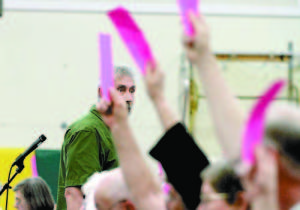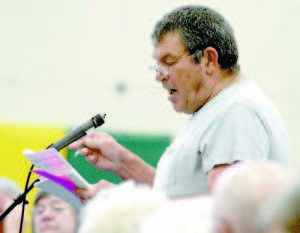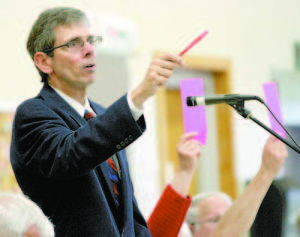Plenty of questions of how money spent at Harrison town meeting

CHECKING THE VOTE — Resident Bob Celeste spent a lot of time at the microphone posing questions and offering amendments during last Wednesday's Harrison annual town meeting. (Rivet Photos)
By Wayne E. Rivet
Staff Writer
HARRISON — As he fired up his laptop computer and opened a spreadsheet listing town financial figures, Bud Finch was asked how long this year’s town meeting would last.
A year ago, voters dispensed the warrant in under an hour — closer to a half hour.
Town Manager Finch was somewhat surprised that Harrison’s annual town meeting last Wednesday became more of a marathon than a sprint, just 23 articles up for voter consideration.
The tone was set early that there were two camps present inside the Harrison Elementary School gym — one willing to follow recommendations made by selectmen and the Budget Committee, and another set to question where money was being spent and why.
Others, like Doug Holt, simply wanted clarification. He questioned why newly-elected selectman Archie Belanger was sitting in the stands and not at the front table with other board members — a practice Holt had seen in his 30-plus years attending town meeting.
Yes, the practice is new, Town Clerk Melissa St. John pointed out. She informed the townspeople a selectman’s term expires on June 30, so Rick Sykes remained at the head table. Officials also believed that the present board was in a better position to answer questions and defend budget requests to taxpayers than a new member who had no hand in developing the proposed articles.
Bob Celeste, a planning board member, was a frequent visitor to the microphone positioned in the middle of the gym. He proposed several amendments during the evening, from reducing the value figure of town-owned personal property to be disposed of by selectmen from $10,000 or less to $5,000, to claiming officials shirked their duty by failing to formally authorize via a vote to transfer funds between accounts to cover overdrafts, rather they allowed the town manager to do so.
After Sykes claimed that he had not voted to approve transfers during his tenure, Celeste polled other selectmen. They too had followed suit. Selectman Matt Frank said the town manager was authorized by the board to make the transfers.
Henry Hudson, a former selectman, seemingly took offense to Celeste’s line of questioning, saying, “Don’t vote for them (selectmen) if you don’t trust them.†Hudson said some of Celeste’s amendments would tie the hands of selectmen to do their jobs.
When Article 7 asked voters to carry undesignated funds to the Capital & Reserve Account, resident Pam Dyer wondered how much money town officials want to salt away rather than use more surplus to further reduce taxes (Article 12 appropriated $686,573 to cut taxes, which was recommended by selectmen)?
Since Finch arrived nearly five years ago to run the town, the manager has created a financial plan that enables Harrison to build its coffers, thus avoiding the need to borrow — be it for new equipment, repairs or covering SAD 17 payments before taxes roll in.
Dyer later questioned why accounts were being overdrawn? Selectman Richard St. John said most overdrafts were “small amounts†resulting from some unpredictable reasons.
In an attempt to speed up conversation, Budget Committee member Colleen Densmore pointed out that the town report is full of detailed financial information, and would likely answer some questions taxpayers may have. She added that if taxpayers wanted a clearer picture, they could attend budget meetings.
Sykes proposed to cut $16,416.83 from the $500,655 administration budget (up $4,842), thus eliminating a per diem clerk. Sykes pointed to other lines in the budget that could cover costs associated with town elections, etc., when more clerical help is needed.
Fire Chief Dana Laplante, however, supported keeping the per diem position funded, since that individual has spent time assisting the department with required paperwork.

A MATTER OF TRUST — Former longtime selectman Henry Hudson urged voters to trust selectmen they elected to represent them and work in the best interest of the town.
“I could spend eight hours a day doing paperwork,†Laplante said.
Finch chimed in by saying use of a per diem position is another way the town has managed to make its limited funds go further, getting work done without making a huge investment (no benefits tagged to this position).
“We are always trying to do more with less,†said Finch, pointing out neighboring towns are having conversations about sharing per diem workers.
Sykes’ reduction request was rejected.
Voters zipped through eight articles, approving the following:
Public Works: $548,125, up $15,606
Fire Department: $99,440, up $2,099
Solid Waste: $243,537, down $4,492
Parks & Rec: $188,003, up $9,078
Insurance: $59,000, up $4,232
Public Safety: $174,501, up $785
Community Services: $79,970, up $2,380
Capital Roads: $400,000, up $50,000
When Article 22 asked to raise $300,000 for the Comprehensive Capital & Reserve Account — an increase of $125,000 — Pam Dyer reiterated a previous comment, feeling the account was “overfunded.â€
“When I was a selectman 25 years ago, we had the same type of account,†Hudson said. By growing the account, the town will be able to purchase town vehicles and build a new town garage without having to borrow from banks and pay interest.
“It’s a good plan. It’s going to save us money,†Hudson said.
The article passed, as did the final one, calling for $580,000 from Capital Reserve to pay for road improvement, a payloader for Public Works, a pickup truck and deferred maintenance.
Sykes noted he had asked Manager Finch for a detailed list of what items fell under “deferred maintenance.â€
Some problems are known, such as the fire department roof needs attention (estimated cost $45,000). Some problems and repairs stem from years of neglect, which the town is playing catch-up on, while others surface unexpectedly, such as a problem with the town office septic system, mold at the municipal building and new doors at the town office were needed to satisfy federal regulations.
Sykes, and others like Pam Dyer and Celeste, pushed for specifics. One resident added, “It should be labeled what it is. We don’t know where it (the money) is going, what needs to be fixed. That’s what we want to know.â€
Others, including Ray Laplante, felt there is no need to micromanage.
“I don’t think people are hearing what is being said,†Dana Laplante said. “It’s been said there is a need for a new fire truck. I bet there are other trucks that are starting to fail.â€
The article passed.
The meeting adjourned at 9:01 p.m.


